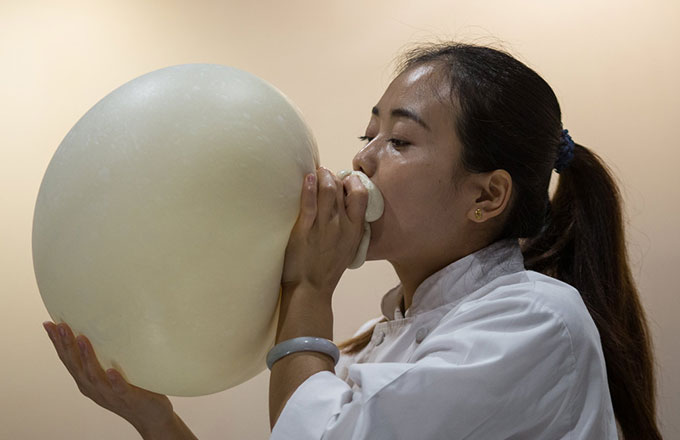Eating less may extend longevity, study finds
In line with the old saying that a good diet cures more than a doctor, people have believed for some time that eating less can preserve health and extend life span.
But there has been little scientific evidence to show how cutting back on the calories can help.
However, scientific research published in Nature Communications on Tuesday could provide a new explanation. Calorie restriction promotes the growth of gut bacteria associated with increased life span in mice, according to a news release from the science magazine.
Chinese researchers gave mice high-fat and low-fat foods — some were given as much food as they wanted (free-feeding), while others were under calorie restriction (given only 70 percent of the food of the free-feeding group).
The results showed that the calorie-restricted low-fat group lived the longest, while the mice that ate as much high-fat food as they wanted had the shortest lives.
Analysis of the mice feces showed that some beneficial bacteria correlate positively with life span and are enriched by calorie restriction, while bacteria that correlate negatively with life span are reduced by the restriction, the news release said.
"Scientific research has been pointing to the result that calorie restriction increases life span, but the unanswered questions are why and how," said Zhao Liping, a professor specializing in microbiology at Shanghai Jiao Tong University, who led the research.
"So this research provides a new angle to explain the relationship between calorie restriction and life span — that calorie restriction might take effect via altering gut bacteria," he said.
In 1935, US biochemist and nutritionist Clive M. McCay showed that calorie restriction increased the life span of mice, which triggered further research and experiments in the field.
Later, the relationship between calorie restriction and longevity was tested on yeast, zebra fish, spiders, dogs, monkeys and orangutans.
"Although we find an association exists between calorie intake and gut bacteria, and bacteria and life span, this is definitely not the only decisive factor for life span," Zhao said.
"On the other hand, we are still not quite sure about the mechanism for how calorie restriction changes gut bacteria, so we are carrying out projects in this direction."
Zhao said one possible reason could be that under calorie restriction all nutrients can be absorbed by the host, with only dietary fibers left for gut bacteria. Good bacteria can grow on dietary fibers, but bad bacteria cannot.
Liu Yong, another leading researcher of the study from the Institute of Nutritional Sciences under the Shanghai Institutes for Biological Sciences of the Chinese Academy of Sciences, said: "Most experiments are carried out on lower organisms. So, from a scientific aspect, we are still not sure whether the theory of reducing calories to increase longevity works in humans, too, because it is not possible to make lifelong tests on people."
However, Liu said some earlier research has shown how gut bacteria influences people's health.
"The human body is a supraorganism (an organism consisting of many organisms). There are enormous numbers of microbial communities that influence people's health.
"For example, a lot of research points to the fact that unhealthy gut bacteria plays a role in causing obesity and metabolic disorders, including diabetes, non-alcoholic fatty liver disease and some cardiovascular disease," he said.
Coincidentally, along with the saying that a good diet cures more than a doctor, in traditional Chinese medicine there is the saying: "Eat less for dinner, get a longer life."
This Chinese proverb somehow reflects the subtle relationship between diet and health, but traditional Chinese medicine is not explaining it from the angle of microorganisms, said Sun Hong, a deputy chief physician specializing in traditional Chinese medicine at Beijing Cancer Hospital.
Sun said traditional Chinese medicine explains healthy living and possible longevity from the angle of keeping a balanced diet and eating a variety of foods.
"The most common rule is to keep to the pyramid-like structure of dieting, which means less sugar and fat, a balanced amount of milk, meat and beans, more fruit and vegetables and food containing carbohydrates," Sun said.
Jiang Mengyun contributed to this story.
Registration Number: 130349



























